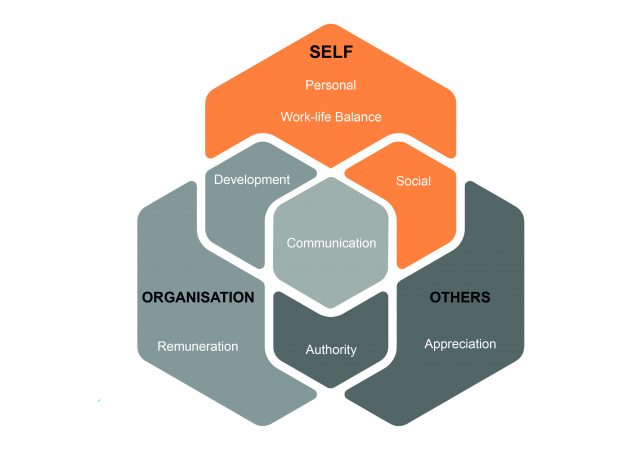Is there a difference between ‘well done’ and ‘thank you’?
Appreciation Expectations
This article on employee expectations looks at ‘appreciation expectations’ at work and how they impact on employee engagement.
Most employees have appreciation expectations and want their contributions to be valued and recognised. However, some employees may not need external appreciation, relying more on their own assessment of their work, but definitely want recognition from their peers. So how does a manager discover each person’s expectations and meet them in the right way?

8 Areas of Employee Expectations
The organisational view
Your organisation may well be able to attract top talent with a competitive salary but if their real retention and engagement factors are not met – they may soon be leaving for an environment where they can be met.
Research by Monster.co.uk found that many of us don’t feel appreciated at work and employees even have put a value to it – they think compensation of £134 a month would cover the amount for not being thanked properly for their work.
The individual’s expectations
Asking the right questions, analysing each individual employee’s real engagement factors, and measuring the person’s level of fulfilment of each expectation ensures managers and the wider organisation provide an environment that retains the best talent.
Appreciation Expectations
Employees who don’t feel appreciated, recognised or listened to are more likely to be unhappy at work than those that get a thank you and notice taken of their efforts once in a while.
Here we look at the different elements that make up an individual’s expectations around appreciation, based on the research of Dr Dan Harrison.
Wants Appreciation
- The desire to have an employer who expresses appreciation for one’s work
- We all want to get some appreciation at work and those that receive it feel better and more secure. The trouble is that many employers and management staff don’t do it enough. Taking time to thank a member of staff for their great work can raise morale and put a smile on people’s faces.
- An employee who isn’t appreciated is going to care a little less about their job each day and bosses need to make sure that this basic social nicety is given more focus. If employee expectations in this area don’t match what the company provides then something will need to change.
Wants Recognition
- The desire for positive acknowledgement (from others) related to one’s abilities and strengths
- If an employee does a good job they want some kind of recognition even if it’s just sending them an email to thank them for all their hard work. Of course, there are some tireless employees who don’t want to be thanked and get embarrassed at being singled out for praise but that doesn’t mean they shouldn’t be shown some form of appreciation.
- It’s not just a simple thank you that employees may want. Recognition could mean the prospect of promotion or a wage increase, the chance to undertake some valuable training or not having those low grade jobs pushed onto them all the time.
Wants Warmth/Empathy
- The tendency to express positive feelings and affinity toward others
- However busy the office is, there’s always time for some warmth, particularly as it helps create a better, kinder environment that improves productivity. During stressful times understanding and empathy can often go out the window but if your employee values this kind of interaction and expects it then there needs to be more effort made on these occasions.
Wants Opinions Valued
- The desire to have an employer who listens and gives importance to one’s views
- Most career minded employees will expect to have their opinions valued. There may be those who don’t put it high up on their list of priorities but most of us like to think we have something important to say from time to time. A low score for expectations in this area could also be a sign that the person in charge is not someone who likes to listen to other opinions.
Is Collaborative
- The tendency to collaborate with others when making decisions
- It’s all very well expecting to be appreciated but if you prefer to work alone and have less focus on effective collaboration then this could point to an imbalance between what is expected and what is actually the case.
- Creating opportunities for better collaboration in an office environment can improve social cohesion and also allow everyone to work more effectively as a team.
Using Harrison Assessments Talent Solutions to understand appreciation expectations
Using the individual Harrison Assessments Engagement and Employment Expectations report (click here to access a sample report) and data provided by Organisational Analytics, managers can measure an number of key employee expectations, the intrinsic behaviours that drive individual and group engagement. This helps to understand any differences between an employee as well as being able to look at the overall group or team’s expectations. These insights facilitate the essential dialogue between employee and manager, fostering a shared responsibility for engagement to build a culture of employee engagement.
Employee Engagement White Paper
- This employee engagement white paper will outline why this is the case and what is needed to achieve a greater impact on organisational performance.
- It includes some key areas relating to engagement in the workplace and a crucial 3-step guide to assist with the application of engagement analytics.
- Written by Dan Harrison, Ph.D. – Organisational Psychology, developer and CEO of Harrison Assessments, this white paper is a must read for anyone involved in employee engagement. Request your copy here –
If you would like to know more please contact me at pat@quadrant1.com



